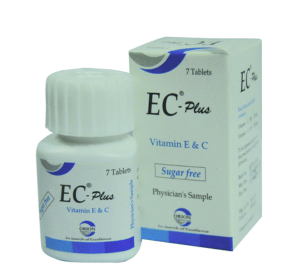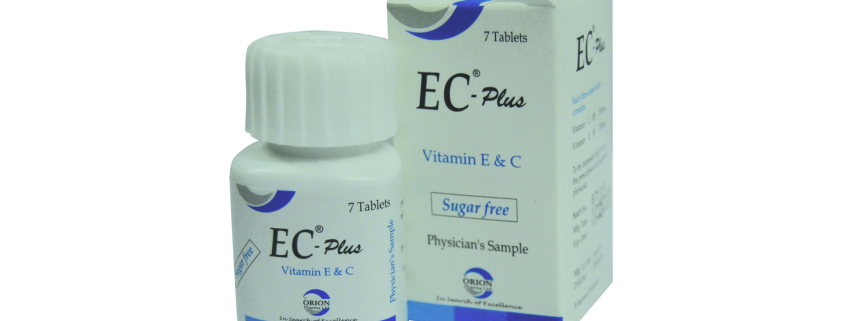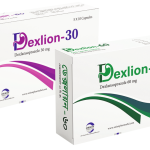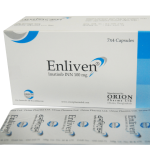EC+

ANTIOXIDANTS: Beta Carotene + Vit E + Vit C
Indication
The active ingredients of EC+ are Beta Carotene, Vitamin E 8 Vitamin C. Beta Carotene is used commonly for the reduction of photosensitivity in patients with erythropoietic protoporphyria and other photosensitivity diseases. Vitamin C and Vitamin E have been linked with reduced risks of cardiovascular diseases in human. All of these antioxidant vitamins have also been linked with reduced risks of cataract. Concurrent intake of Vitamin E and Vitamin C suggests that their action may be synergistic. Supplementation with Vitamin E shows to reduce the susceptibility of blood lipoproteins (the proteins that carry cholesterol in blood) to oxidation, which is the major causative factor in the formation of atheroma in the walls of blood vessels. Vitamin E also helps to protect the immune system and hence to combat infection and chronic diseases. Vitamin E may also be of value in reversing the age related trend toward decreased competence of the immune system, as well as other age-related degenerative changes. Moreover, it was recently reported that high-dose supplementation with vitamin C could correct the elevated sorbitol levels seen in diabetics, inhibiting the activity of the enzyme aldose reductase.
Contraindication
EC+ is contraindicated in patients with hypersensitivity to any of its components. Vitamin C in megadoses has been oontra-indicated for patients with hyperoxaluria. A pregnant woman taking more than 5 gm daily ascorbate may suffer from fetal abortion. Higher doses of Vitamin C have reported to cause failure of conception. In case of Vitamin E, there is no absolute contra-indication.
Dosage & Administration
EC+ tablet is administered orally. The adult dose is 1 tablet daily or as directed by the physician.
Side Effect
Vitamin C is usually well tolerated. Large doses are reported to cause diaritiea or other gastrointestinal disturbances. It has also been stated that large doses may cause hyperoxaluria and the fomation of renal calcium oxalate calculi and it should therefore be given with care to patients with hyperoxaluria. Vitamin E is usually well tolerated. Large doses may cause diarrhea, abdominal pain, and other gastrointestinal disturbances, and have also been reported to cause fatigue and weakness.
Precaution
Hypervitaminosis A can occur if Beta Carotene is taken too much. Vitamin C should be given with care to patient with hyperoxaluria. In patients taking oral anticoagulants or oestrogens, Vitamin E should be given carefully because it has been found to antagonize the effects of Vitamin K leading to an increase in blood clotting time in these patients.
Drug Interaction
Orlistat can cause a decrease in the absorption of Beta Carotene resulting in a reduced serum concentration and potentially a decrease in e9icacy. Vitamin C is incompatible in solution with Aminophylline, Bleomycin, Erythromycin, Laclobionate, Nafcillin, Nitrofurantoin, conjugated Oestrogens, Sodium bicarbonate, Sulphafurazole diethanolamine, Chloramphenicol sodium succinate, Chlorthiazide sodium and Hydrocortisone sodium succinate. It increases the apparent half life of Paracetamol and enhances iron absorption from the gastrointestinal tract. No potentially useful drug-interaction with Vitamin E has been described. However, high doses of Vitamin E can impair intestinal absorption of Vitamin A and K.
No potentially useful drug-interaction with Vitamin E has been described. However, high doses of Vitamin E can impair intestinal absorption of Vitamin A and K.
Use Pregnancy Lactation
Beta Carotene : Pregnancy category C. Vitamin E: The safety of high-dose therapy has not been established and no contraindication to breast-feeding by mothers taking the normally recommended dose. Vitamin C: The drug is safe in normal doses in pregnant women, but a daily intake of 5 g or more is reported to have caused abortion. The drug may be taken safely during lactation.
Packaging
EC+ Tablet: Each airtight HDPE container contains 30 tablets



